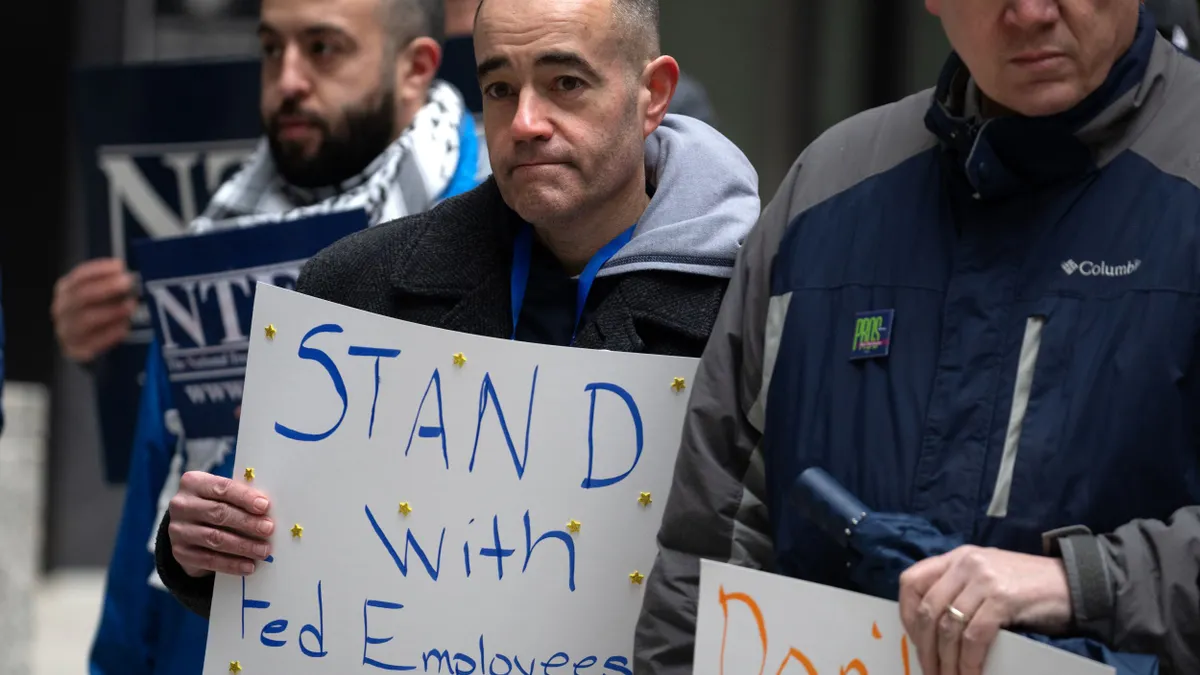It's been nearly 15 years since the U.S. Department of Labor (DOL) last updated its minimum salary threshold that dictates in part whether an employee is exempt from overtime under federal law — and despite a sign of movement last week, there's yet more waiting to do.
DOL's Mar. 7 announcement revealed that a new proposal is imminent, offering some clarity in the fallout of the Obama administration's attempt to change the rule in 2016. The Notice of Proposed Rulemaking (NPRM) will suggest a new overtime exemption threshold of $35,308 a year or about $679 a week — much less of a jump than the Obama-era $47,476 proposal. The rule hasn't yet been published in the Federal Register, and it will be subject to a 60-day public comment period once it is.
The agency has published an unofficial version of its NPRM, however, and experts told HR Dive that while they don't expect drastic alterations, there's still a ways to go before a final rule is implemented. Alfred B. Robinson, shareholder at Ogletree Deakins and former acting administrator of DOL's Wage and Hour Division (WHD), said in an interview that he estimates the implementation date could be between the third and fourth quarters of 2019 — and that doesn't include any litigation that could be beset the new rule.
But experts also were clear that HR shouldn't play the waiting game; they listed several things for employers to place on their to-do list in the meantime.
#1: Start auditing
Under the new salary threshold, more than 1 million U.S. workers would be newly eligible for overtime pay, DOL said in its statement on the rule. Employers need to remember that the threshold isn't the sole arbiter of classification; workers also must pass a duties test to qualify for overtime exemption.
The rules exempt employees who (1) earn more than $35,308 and (2) work in specifically-defined executive, administrative, professional, computer and outside sales roles. Employers might consider auditing their pay practices with respect to both the Fair Labor Standards Act's salary test and its duties tests. "It is a really good time to conduct an audit of the job duties of the employees you're classifying as exempt," Tammy McCutchen, former WHD administrator and shareholder at Littler Mendelson, told HR Dive in an interview.
The duties test aspect is important, because there's a chance employers have misclassified some of the workers who make a salary above the current salary threshold, but whose job descriptions or day-to-day work may not actually pass a duties test. "I always tell employers to review their employment practices in this regard," David Miller, attorney at Bryant Miller Olive, told HR Dive in an emailed statement. "The hassle and cost of the review is insignificant compared to what they’ll pay in trouble and treasure if they’re sued — even if they win."
While it's not yet clear which industries will be most heavily impacted by the salary threshold increase, a 2016 WHD analysis of the Obama-era rule showed that education and health services, professional and business services, and financial activities sectors had the highest number of potentially affected workers.
#2: Decide how to handle pay increases
As the Obama-era rule approached its effective date, many employers raised base salaries for certain employees in order to put them over the new threshold. When the rule was enjoined at the 11th hour, experts warned HR departments about rolling back those increases, for fear of hurting morale or worse.
The new proposal may prompt similar action, according to Miller, given the more modest increase put forward. "This is simplistic, of course, because there are other considerations that would go into that decision, such as the administrative burden of recordkeeping and calculations associated with overtime and employee morale," he said. "My expectation is that more employers will be willing to give the necessary raises to maintain the salary qualification under this rule than under the much more expensive and burdensome Obama proposal."
At the same time, the rule would allow employers to count "certain nondiscretionary bonuses and incentive payments" as up to 10% of an employee's salary when determining whether they're exempt. That's an important tool for employers, Robinson said, because the rule will count payments that are made annually. Under the Obama administration's rule, those payments had to be made quarterly or more frequently to be counted toward the threshold, he explained.
But there are other considerations HR should make when assessing, on an individual basis, whether to raise a worker's wage or pay overtime, Myrna Maysonet, partner and chief diversity officer at Greenspoon Marder LLP, told HR Dive in an interview. Now might be the time to evaluate whether an employers is truly paying competitive wages in its market, particularly if the business only operates within a specific region, state or city. "A lot of this stuff is market driven," Maysonet said. "What the market supports in Orlando may not be the same as what is supported elsewhere." Some states and cities also already have overtime thresholds that are higher than the new — and old, for that matter — DOL proposal. New York City, for example, has a threshold of $1,125 per week ($58,500 per year) for employees at companies with 11 or more employees.
Maysonet suggested that HR professionals might want to talk to in-house executives, accountants and department heads in charge of budgets before communicating any changes.
#3: Submit a comment
Until a rule takes effect, it's not yet final, sources stressed. But many who spoke with HR Dive encouraged employers to be involved in the upcoming public comment process.
"The whole point of notice and comment rulemaking is that it is exactly that," Susan Harthill, partner at Morgan Lewis and former deputy solicitor of labor for national operations at DOL, told HR Dive in an interview. "I would encourage employers to participate in the process."
McCutchen made similar comments, noting that until a new rule is final, there's still a chance the Obama administration's enjoined rule can come back. "We need to keep up the pressure," she said. "We need to comment."




















